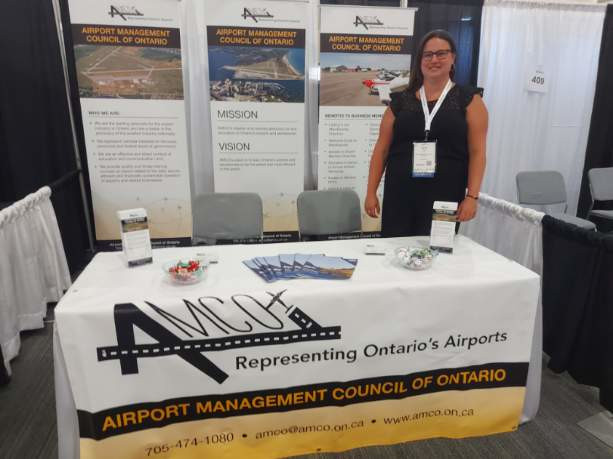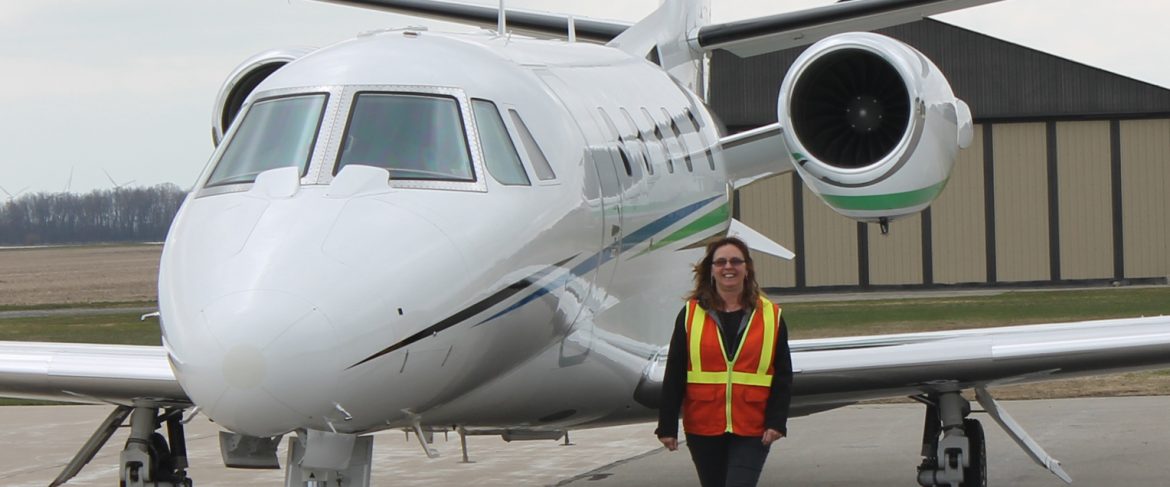Airport Management Council of Ontario
Supporting Ontario’s Airports Is Key to Prosperity
By: Rejeanne Lacroix
Airports across Ontario are as unique as the communities in which they operate, providing
significant social and economic value to the citizens that reside in their environs. These ports of
critical infrastructure buzz daily with activity to ensure a reliable movement of people and goods
as well as convenient staging points for complex logistical operations. With membership
encompassing both northern and southern Ontario, the Airport Management Council of Ontario
(AMCO) steadfastly advocates for its members with full knowledge of the value airports bring to
the province, including their intrinsic connection to economic development.
A key point about airports and their financial viability is that they must remain operational even
in the absence of commercial air or cargo operations because they provide essential services.
Local airports are often only associated with being gateways to the world due to their affiliation
with travel, but they offer communities so much more. One can simply reflect upon the medical
evacuation (medevac) flights transporting critically ill patients, disaster evacuation flights
carrying Ontarians to safety, seasonal wildfire suppression activities, and assisting law
enforcement in their public safety operations. It is indisputable that airports are at the centre of
these very important public services that provide immense social value to communities across
the province.
Communities oftentimes highlight the economic value of having a readily accessible airport
when promoting their municipalities as a place to invest in and conduct business. Indeed, one can
easily perceive the financial benefits of airports when local businesses in Ontario expand their
reach to national, continental, and international markets by way of the seamless transit of goods.
Certainly, the resilience of e-commerce and its reliance on a steadfast transportation network
exemplifies this point. Having an airport in proximity results in robust movement of people too.
Local airports help facilitate the exchange of innovative ideas as well as open areas of potential
exploration and development thus making nearby municipalities attractive for both start-up
potential and capital investments. One needs to only reflect upon the advantages that tourism
brings to municipalities and the revenue generated from flight schools too. Those employed by
airports as well as those providing contracted services often bring specialized talents to their
respective communities. The value of airports in terms of economic development is easily
perceptible and should be a lauded feature of this infrastructure.

Nonetheless, airports are costly to maintain at a level of high functionality. It is no secret that
airports — particularly small and medium-sized ones — faced immense struggle to endure the
COVID-19 pandemic as they experienced substantial revenue losses. Despite the suspension of
passenger services, airports still had to offer the same high level of safety and security.
Commitment to these two hallmarks of Canadian air transportation and related infrastructure
requires remaining up to date with new regulatory changes made at the federal level of
government. Remaining compliant with new federal regulations is a big-ticket responsibility of
airports as one would expect. Further, as in the general business environment, costs are rising for
basic operational needs at airports.
It is the vision of AMCO to guide the airports of Ontario to be the safest and most efficient in the
world. The conduit to achieving this goal rests on our mission to provide educational
opportunities in the topics related to the safe, secure, effectual, and financially sustainable
operation of airports and related businesses as well as being a leading advocate for airports and
aerodromes across Ontario. AMCO advocates in a non-partisan manner, ready to work with
local, provincial, and federal levels of government to promote the value of Ontario’s airports. As
our membership encompasses all regions of Ontario, includes airports and aerodromes of all
sizes, and welcomes businesses key to airport operations, we have exceptional knowledge and
insight into the airport environment in Ontario. By extension, we truly understand the economic
potential that airports offer communities across the province.
The Study of Ontario’s Airports and Aerodromes ─ commissioned by AMCO, completed by HM
Aero Aviation Consulting, and released in June 2022 ─ details the social and economic values
provided by the sector but calls attention to the major challenges that chronically beset airports
across the province as well. Federal regulatory changes, municipal financial pressures,
decreasing political and public will, and a sluggish recovery from the COVID-19 pandemic all
contribute to the difficulties airports experience. The study made a series of recommendations
geared to the federal and provincial governments respectively.

First, the Government of Ontario should implement a provincial funding program that addresses
identified gaps in the federal Airports Capital Assistance Program (ACAP) through the
rehabilitation and reconstruction of existing airside assets and supporting aeronautical
infrastructure; the procurement of replacement mobile equipment for maintenance and
firefighting; and initiatives to improve energy efficiency and/or decrease greenhouse gas
emissions. Financing for such a program could come from the full or partial allocation of the
provincial aviation fuel tax and reinvesting the revenues generated through the functioning of
Ontario’s aviation sector. A second recommendation calls for the restoration of the Ontario Air
Advisory Panel as a conduit to advise the Ministry of Transportation and Province of Ontario on
issues of importance to airport operators. This body potentially includes representatives from the
airport sector, municipalities, key aircraft operators, and the Government of Ontario so that all
are kept aware of provincial policy development affecting the sector.
At the federal level, two recommendations focus on much-needed funding. ACAP needs to be
recapitalized; therefore, Transport Canada should meet with industry stakeholders across the
country to determine an appropriate revised funding allocation that aligns with costs associated
with implementing safety-related projects in contemporary conditions. Airport advocacy
associations across Canada state the current target for ACAP is $95 million annually ─ an
increase from the $36 million meant to cover programming nationwide. Further, the
reinstatement and recapitalization of the Regional Air Transportation Initiative (RATI) or a
similar program is recommended. RATI had a budget of $206 million from 2021-23 to assist
regional air transportation ecosystems during the pandemic; however, these funds are still
acutely needed.
Investment in airport infrastructure can thus be considered an investment in economic
development for the communities that utilize their services. For instance, Action. Collaboration.
Transformation: The Final Report of The National Supply Chain Task Force (2022) rightfully
notes, “As Canada’s trade volumes continue to increase, investment in critical infrastructure
assets such as seaports, railways, highways and roads, and airports must also increase to meet
demand.” Having well-funded airports accompanied by staunch business spirit in municipalities
will undoubtedly attract investment to regions across the province. Access to previously
unconsidered markets consequently leads to dynamic marketing plans and revenues kept within
communities. The link between airports and the ability to grow business is certainly perceptible.
Representatives of AMCO member airports can attest to the value of their local facilities and
their relation to economic development in their respective communities. Their testimonies will
be just as exceptional as the communities in which these airports operate. As the leading
advocate of airports in Ontario, we will continue to be proponents for this critical infrastructure,
knowing the immense social and economic benefits that they bring to communities across the
province. An investment in airports is an investment in reliable critical services and a bright
economic future for Ontarians.
AT A GLANCE
Airport Management Council of Ontario (AMCO)
What: A non-profit organization that advocates for Ontario’s airports and promotes their safe operation
Where: North Bay, Ontario
Website: https://www.amco.on.ca

